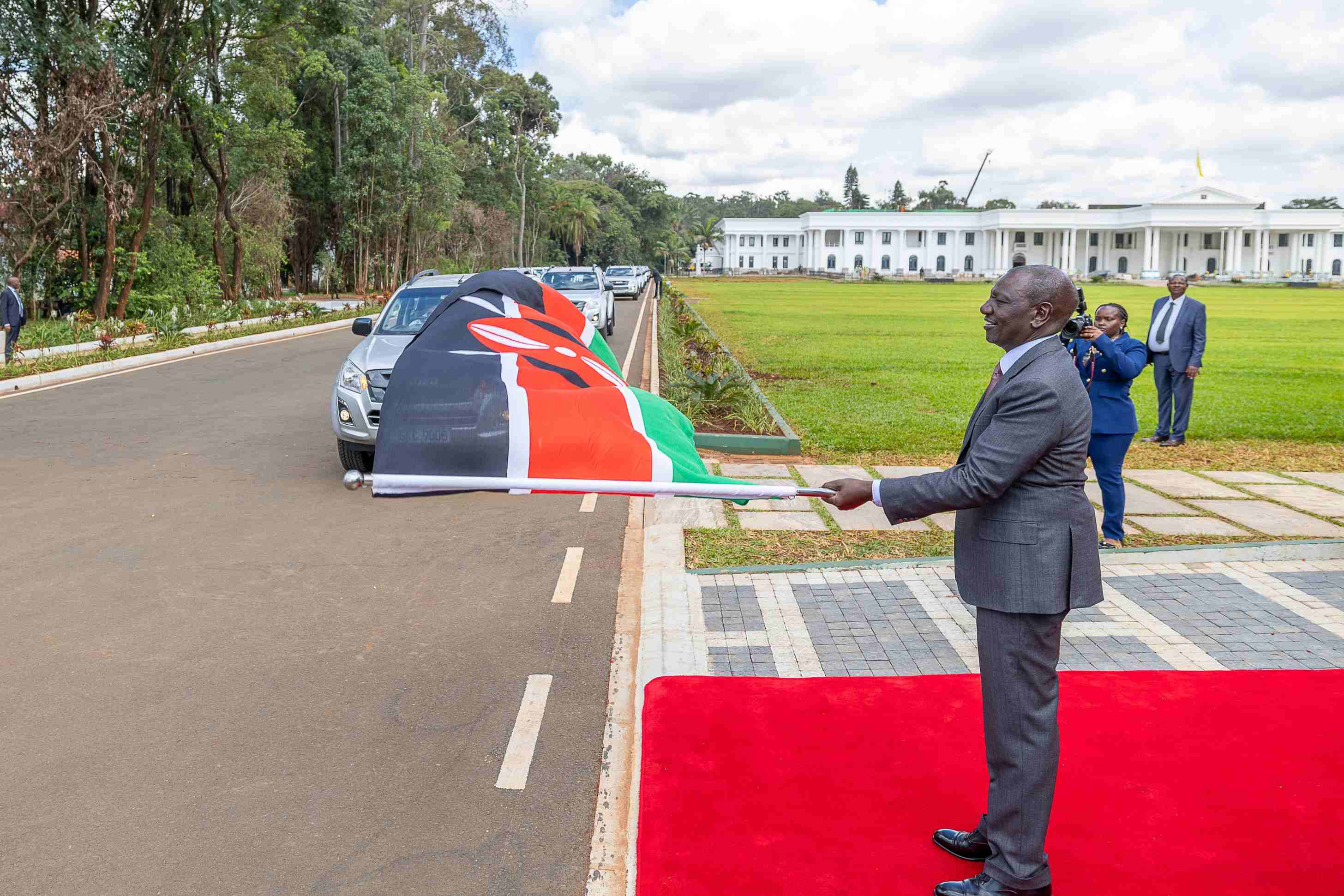President William Ruto has issued a firm directive to end the recurring medicine shortages in public hospitals, popularly known as the ‘Hakuna Dawa’ problem, saying the government has now put in place enough resources and a proper plan to ensure essential medicines reach health facilities across the country.
Speaking at State House, Nairobi, during the flagging off of disease surveillance vehicles to all 47 counties, Ruto said the Kenya Medical Supplies Authority (KEMSA) has been given a Sh10 billion financial facility to supply every commodity required by county governments.
He said this funding removes any excuse for delays or gaps in the supply of essential drugs.
"We have provided a facility of Sh10 billion to KEMSA, and they have absolutely no reason today why they cannot supply every commodity that is required by counties," said the President.
He asked county governments to honour their end of the bargain by paying for the medicines they receive.
"As we pay their share claims, we must also make sure that we pay for the medicines being supplied by KEMSA. It’s just what it is," he said.
Counties told to act on Payments
President Ruto made it clear that counties must commit to settling their pending bills to KEMSA to keep the supply chain running smoothly.
He said an agreement between the Social Health Authority (SHA), KEMSA, and county governments must be respected and implemented.
"My request to county governments is simple—let’s agree that as we pay your claims, you also pay for the medicines. That is the agreement we have," he said.
Ruto warned that the biggest complaint in the public health sector remains the unavailability of drugs, and it must be addressed urgently.
 President William Ruto flagging off Disease Surveillance Vehicles at State House, Nairobi. PHOTO/PCS
President William Ruto flagging off Disease Surveillance Vehicles at State House, Nairobi. PHOTO/PCS
"The biggest quarrel from the public in our health facilities is the Hakuna Dawa thing. That’s the only thing still holding us back. We must deal with it," explained the President.
To increase the availability of medicines in public hospitals, the President said the government is also changing how funds are disbursed, now sending money directly to health facilities.
He said this should translate to faster and more reliable access to medicines.
Ruto also called for quick implementation of a proposed framework between SHA, KEMSA, and county governments to ensure consistent drug supply.
"Now that we are paying from SHA direct to the facilities, there is every reason why we should make sure that the medicines are available," he remarked.
The President also spoke about the government’s efforts to digitise healthcare delivery to stop fraud and eliminate ‘ghost’ patients.
He said a paperless system is already being piloted in six counties and will be rolled out nationwide within the next six months.
"We just want to make sure that fraud and treating non-existent people stops. Technology is going to help us. We will work with you to make sure that there are no ghost people taking medicine and stealing from us," Ruto said.
He also urged counties to work with the Ministry of Health to ensure the process is smooth and efficient.
During the event, Ruto handed over disease surveillance vehicles to all 47 counties, describing the move as a major step in improving emergency health response across the country.
He said these vehicles enhance logistical capacity and are part of the government’s commitment to strengthening public health at the grassroots level under the Bottom-Up Economic Transformation Agenda.
Kenya’s progress in disease surveillance, emergency response and diagnostic capacity, he said, has laid a strong foundation for the ongoing rollout of Universal Health Coverage (UHC).
Ruto said that since the launch of Taifa Care in October 2024, more than 22 million Kenyans have registered with the Social Health Authority (SHA), with 45,000 new registrations happening daily.
He said the government has allocated enough funds to ensure that all Kenyans registered with SHA can access primary healthcare services for free.
Public health facilities at Levels 2, 3, and 4, as well as SHA-contracted hospitals, have been instructed not to charge patients since payments are being made directly by SHA.
To support the rollout of this model, the President said the recruitment of new staff at SHA is almost complete, with a focus on hiring qualified professionals.
He added that staff from the defunct NHIF have been given priority, and those not taken up will be redeployed to other public service roles.
 President William Ruto with several leaders during the flagging off Disease Surveillance Vehicles at State House, Nairobi. PHOTO/PCS
President William Ruto with several leaders during the flagging off Disease Surveillance Vehicles at State House, Nairobi. PHOTO/PCS
"My assurance to all Kenyans is that no one will lose their job," said Ruto.
On medical equipment, Ruto said the government has received a full list of facilities from counties where new equipment should be delivered.
He directed the Ministry of Health to move quickly and ensure all requested items are delivered.
For facilities that cannot be placed under the fee-for-service model, he said the government will pay 30 percent of the cost upfront, while counties will cover the rest over time.
"We needed to sort out payment. We needed to sort out commodities. We needed to sort out equipment. Those are the three things, and we are going to do it collaboratively," Ruto said.
He concluded by calling on all Kenyans to register with SHA and abandon the old practice of relying on harambees and WhatsApp fundraisers for medical expenses.
"Let us move away from the burden of harambees and WhatsApp groups. We are building a sustainable, dignified healthcare system that serves everyone without discrimination," he said.
